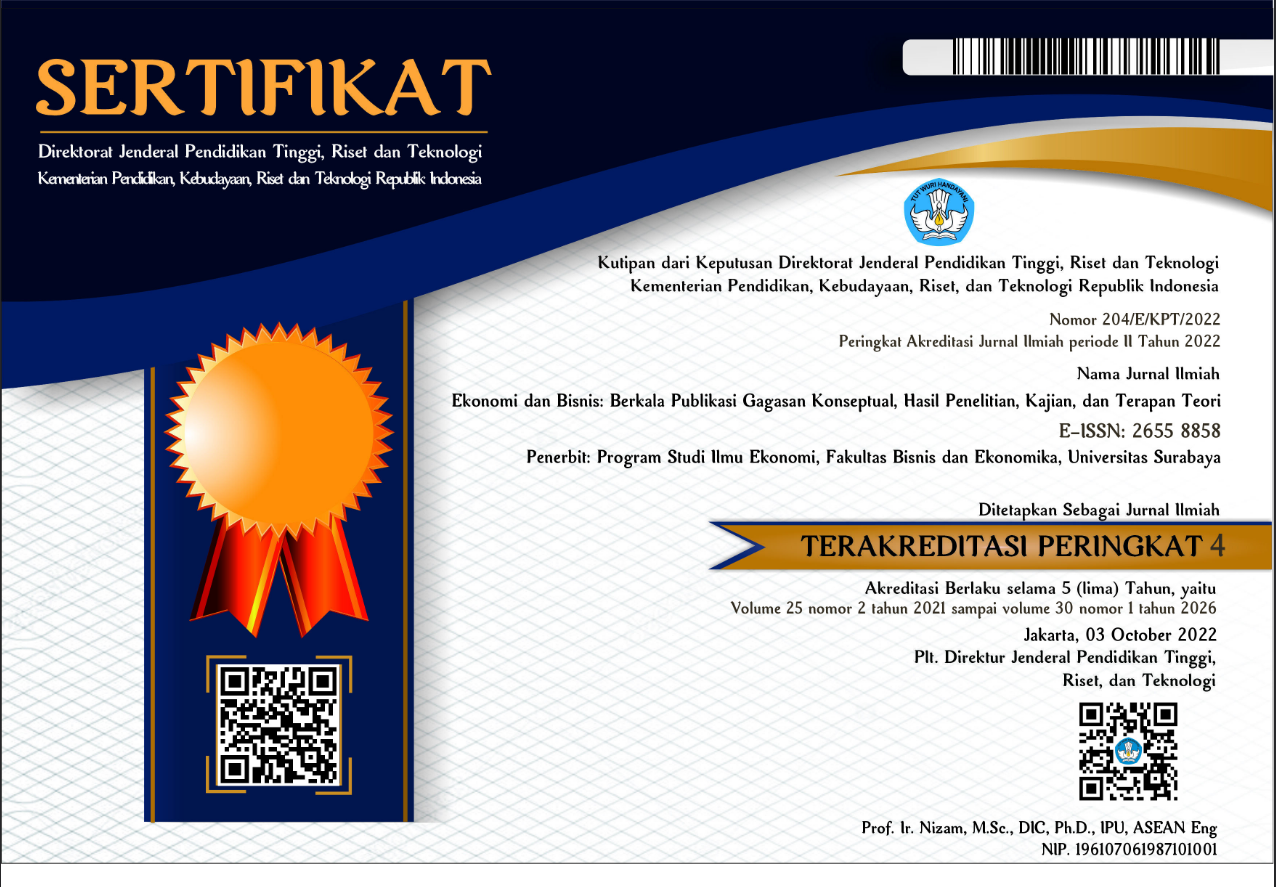ANALISIS MINAT BERWIRAUSAHA MELALUI IMPLEMENTASI DUA PERSPEKTIF TEORI (SCT x TPB)
 Abstract Views:
802 times
Abstract Views:
802 times
 PDF (Bahasa Indonesia) Downloads:
801 times
PDF (Bahasa Indonesia) Downloads:
801 times
Abstract
Entrepreneurs play a significant role in a country's development, particularly in its economic growth. Recognizing the importance of entrepreneurship, many countries, including Indonesia, have integrated entrepreneurial education into their school curriculum to equip students with fundamental entrepreneurial skills and knowledge. This implementation aims to foster students' entrepreneurial intention upon graduation. This study aims to investigate the impact of entrepreneurial education on students' entrepreneurial intention. To achieve this goal, we employ two theoretical frameworks: The Social Cognitive Theory (SCT) and The Theory of Planned Behavior (TPB). Both theories emphasize the role of self-efficacy as a key determinant of individual intention towards behavior. Additionally, TPB highlights the significance of perceived behavioral control in shaping individual intention. By utilizing Partial Least Square (PLS) analysis, we examine our proposed conceptual framework, which explores the relationship between entrepreneurial education and students' entrepreneurial intention. Our findings indicate that self-efficacy plays a crucial role in mediating the link between entrepreneurial education and entrepreneurial intention. However, we were unable to provide sufficient evidence to support the significant impact of perceived behavioral control on improving students' entrepreneurial intention. The results of this study hold both theoretical and practical implications, which will be thoroughly discussed.
Downloads
References
Bae, T. J., Qian, S., Miao, C., & Fiet, J. O. (2014). The relationship between entrepreneurship education and entrepreneurial intentions: A meta–analytic review. Entrepreneurship Theory and Practice, 38(2), 217–254.
Doanh, D. C., & Bernat, T. (2019). Entrepreneurial self-efficacy and intention among Vietnamese students: A meta-analytic path analysis based on the theory of planned behavior. Procedia Computer Science, 159, 2447–2460. https://doi.org/10.1016/j.procs.2019.09.420
Hair, J. F., Hult, G. T. M., Ringle, C. M., Sarstedt, M., Danks, N. P., & Ray, S. (2021). An introduction to structural equation modeling. In Partial Least Squares Structural Equation Modeling (PLS-SEM) Using R (pp. 1–29). Springer.
Hassan, A., Anwar, I., Saleem, I., Islam, K. M. B., & Hussain, S. A. (2021). Individual entrepreneurial orientation, entrepreneurship education and entrepreneurial intention: The mediating role of entrepreneurial motivations. Industry and Higher Education, 35(4), 403–418.
Jiatong, W., Murad, M., Bajun, F., Tufail, M. S., Mirza, F., & Rafiq, M. (2021). Impact of Entrepreneurial Education, Mindset, and Creativity on Entrepreneurial Intention: Mediating Role of Entrepreneurial Self-Efficacy. Frontiers in Psychology, 12. https://doi.org/10.3389/fpsyg.2021.724440
Kusmintarti, A., Ismanu, S., & Riwajanti, N. (2018). Gender as a Moderator of the Influence Entrepreneurial Education and Entrepreneurial Characteristics on Entrepreneurial Intention. International Journal of Engineering & Technology, 7(3.30), 469–473.
Lin, S., De-Pablos-Heredero, C., Botella, J. L. M., & Lian, C. L. (2023). Influence of entrepreneurship education on the entrepreneurial intention of Chinese students enrolled at universities in the Community of Madrid. IEEE Access.
Lin, S. H., Lee, H. C., Chang, C. Ter, & James Fu, C. (2020). Behavioral intention towards mobile learning in Taiwan, China, Indonesia, and Vietnam. Technology in Society, 63. https://doi.org/10.1016/j.techsoc.2020.101387
Liu, X., Lin, C., Zhao, G., & Zhao, D. (2019). Research on the effects of entrepreneurial education and entrepreneurial self-efficacy on college students’ entrepreneurial intention. Frontiers in Psychology, 10(APR). https://doi.org/10.3389/fpsyg.2019.00869
Lv, Y., Chen, Y., Sha, Y., Wang, J., An, L., Chen, T., Huang, X., Huang, Y., & Huang, L. (2021). How entrepreneurship education at universities influences entrepreneurial intention: Mediating effect based on entrepreneurial competence. Frontiers in Psychology, 12, 655868.
Munir, H., Jianfeng, C., & Ramzan, S. (2019). Personality traits and theory of planned behavior comparison of entrepreneurial intentions between an emerging economy and a developing country. International Journal of Entrepreneurial Behavior & Research, 25(3), 554–580.
Shi, Y., Yuan, T., Bell, R., & Wang, J. (2020). Investigating the relationship between creativity and entrepreneurial intention: the moderating role of creativity in the theory of planned behavior. Frontiers in Psychology, 11, 1209.
Wilson, F., Kickul, J., & Marlino, D. (2007). Gender, entrepreneurial self–efficacy, and entrepreneurial career intentions: Implications for entrepreneurship education. Entrepreneurship Theory and Practice, 31(3), 387–406.

This work is licensed under a Creative Commons Attribution-ShareAlike 4.0 International License.

 DOI:
DOI:















